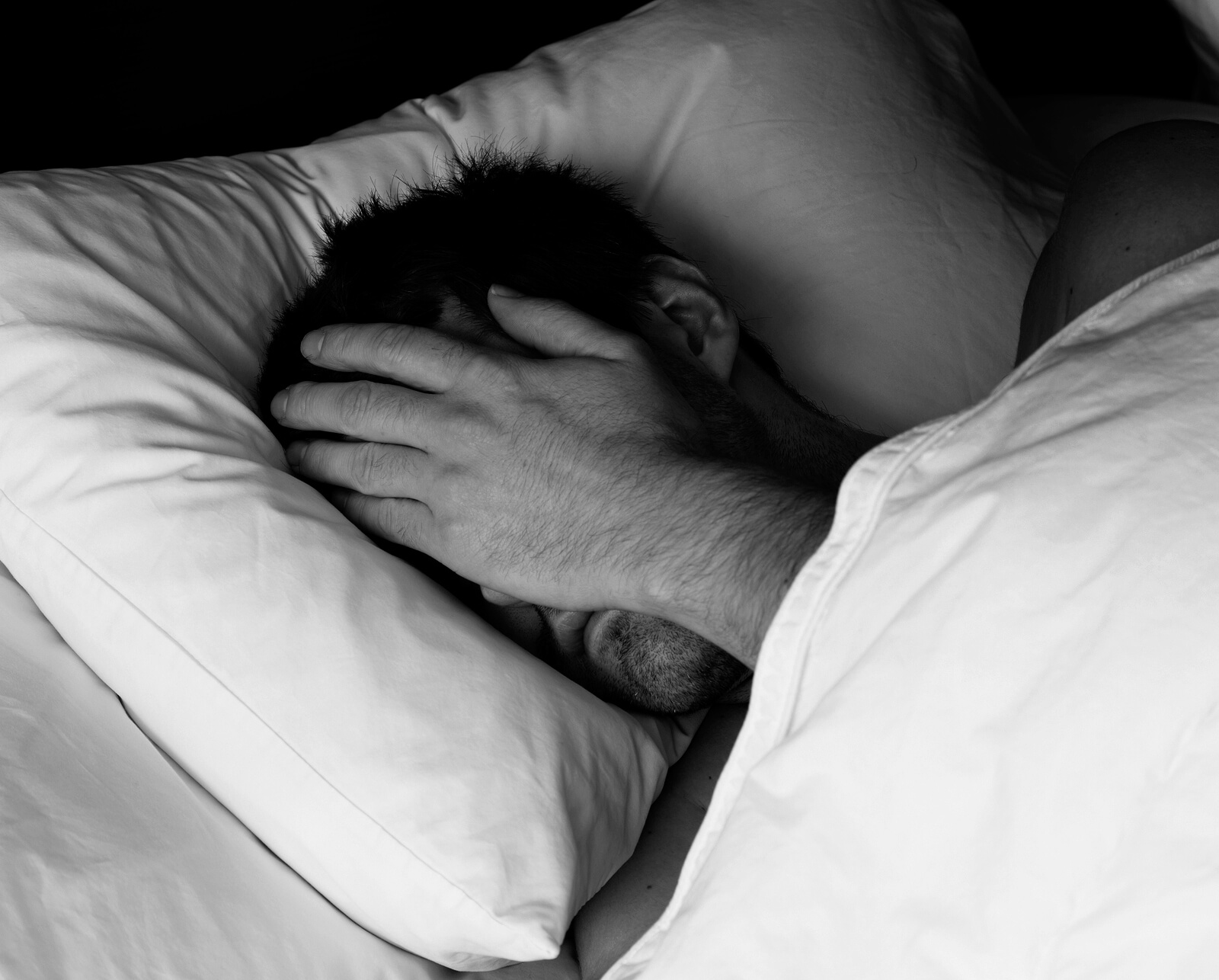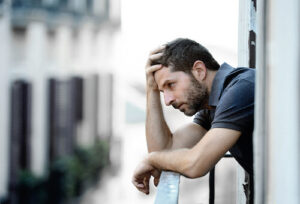Why Alcohol Causes Hangover Anxiety (i.e., Hangxiety)
Anxiety is a feeling of worry, unease, and/or fear that’s often accompanied by physical feelings such as nausea and chest tightness. “Hangxiety” (i.e., hangover anxiety), on the other hand, involves anxiety-like feelings that occur after drinking alcohol, most often following a night of drinking.
Studies have found that alcohol can cause anxiety, especially when consumed in large amounts or when used as a coping mechanism for stress and other forms of emotional distress. So if you’ve jolted awake at 3 a.m. in a panic after a night of heavy drinking, hangxiety may be to blame. Understanding what’s happening as well as the physiological and psychological causes of hangxiety may help you avoid it in the future.
Physiological Causes
Hangxiety is typically caused by three factors: increased cortisol levels, decreases in GABA in the brain, and increased heart rate.
Increased Cortisol Levels
Cortisol is a stress hormone that is responsible for regulating our immune, reward, cognition, and emotion systems. Cortisol levels begin to increase in the second half of the night, peak in the early morning, slowly decrease throughout the day, and hit the lowest point in the first half of sleep. Heavy drinking disrupts this normal process by increasing the level of cortisol and preventing it from declining normally. Heavy drinking additionally influences cortisol because it puts the body in a state of stress, and entering withdrawal causes even more stress.
Elevated cortisol changes the way that neurons send signals by making neurons more active. This overactivity can be perceived as anxiety and restlessness. A 2019 study published in Addiction Biology compared those who participated in binge and heavy drinking to social drinkers who drank moderately. It found that stress in combination with alcohol cues increased cravings in those who drank heavily or binged on alcohol but not in the moderate drinker group. Those who binged or drank heavily also had a rise in cortisol after drinking that was associated with even more cravings for alcohol.
Furthermore, studies suggest that women are generally more impacted by this phenomenon than men. According to a 2008 study published in The Journal of Clinical Endocrinology and Metabolism, alcohol’s impact on cortisol was stronger in women. For men, units of alcohol per week had the most impact on raised cortisol levels. For women, units per week along with how often they drank and how much they drank in one drinking session all had an impact on raising cortisol levels.
Decreased GABA in the Brain
The brain maintains homeostasis between our main excitatory neurotransmitter, glutamate, and our main inhibitory neurotransmitter, gamma-aminobutyric acid (GABA). These neurotransmitters work together to keep our brain activity in balance. This is important because too much glutamate can lead to seizures, and too much GABA can lead to coma.
Alcohol boosts GABA and slows down brain activity. This is why you feel relaxed and calm when you drink alcohol. However, the brain is very adaptable and is always trying to stay in balance. When you drink heavily and/or frequently, the balance has tipped towards GABA. If this happens, the brain does two things to restore balance. It reduces the amount of GABA receptors on the outside of neurons, and it increases the amount of glutamate in the brain.
With less GABA receptors, it’s harder for alcohol to calm us down, so we require more alcohol to have the same effect. Plus, with more glutamate, the brain is more excitable and stimulated. As the alcohol wears off, it’s no longer stimulating GABA and slowing down your brain. But you have extra glutamate circulating around that is speeding things up. Bottom line: This condition causes that middle-of-the-night panic you feel after a night of heavy drinking, and it can increase anxiety the following day or for several days.
Increased Heart Rate
A 2020 meta-analysis found that even 1 standard drink is enough to increase a person’s heart rate. This is because alcohol causes dehydration, and it doesn’t just make you feel excessively thirsty in the middle of the night. Dehydration decreases the amount of blood circulating through the body, so the heart needs to beat faster to compensate.
Psychological Causes
Aside from physiological causes, hangxiety is also related to psychological factors, such as regret and worry, expectations, and mental health conditions.
Regret and Worry
Waking up with a fuzzy memory can lead to spiraling thoughts about what you did the night before, what other people must think of you, and if anyone is going to say something to you about it. You may be concerned that people are mad at you or worry about text messages, calls, or emails that you made or sent while drinking. Regret and worry are particularly prevalent after blacking out from drinking and trying to piece together the binge-drinking episode.
Expectations
If you expect to feel relaxed after drinking, you may feel anxious if this doesn’t happen. This can lead to increased levels of worry and fear as you struggle to understand why you’re feeling anxious instead of relaxed. As we drink more regularly, we develop tolerance, and we need more alcohol to get the same effect. Tolerance occurs because the brain is trying to stay in balance, so it will attempt to balance out all of the physiological effects, thus reducing the impact of each drink. Instead of needing one glass of wine to relax you, you’ll likely need two, and then three, and so on.
Mental-Health Conditions and Self-Medicating
There is a strong link between mental-health conditions, such as depression and anxiety, and alcohol use. People who struggle with their mental health are more likely to turn to alcohol as a form of self-medication, which can lead to increased feelings of anxiety. It’s estimated that 20% of people who suffer from anxiety use alcohol to cope with their symptoms, and people who have anxiety are 3 times more likely to struggle with alcohol at some point in their lives.
A 2003 study published in the Journal of Abnormal Psychology followed 412 depressed patients over a 10-year period. At the end of the study, 43% of people who drank to cope developed an alcohol use disorder, compared to only 15% of the participants who did not drink to cope. Another 10-year study published in 2001 found that drinking to cope is linked to alcohol abuse, negative drinking outcomes, and symptoms of anxiety and depression.
The 3 a.m. Wakeup and Beyond
When you drink heavily, you may be jolted awake at 3 a.m. with hangxiety. This happens because alcohol initially makes it easier to fall asleep, but once the alcohol begins to wear off, you are left with elevated cortisol and glutamate levels, which both make it more difficult to sleep. Remember, the more alcohol you drink, the faster your heart beats, so your overexcited brain is accompanied by a racing heart, making it even harder to go back to sleep. 
The amount of time it takes for hangxiety to pass depends on the individual and factors such as genetics, anxiety levels without alcohol, how much alcohol has been consumed, and how regularly the individual drinks. Generally, hangxiety should begin to fade after 24 hours, but if you are drinking frequently, then you may often be in a state of hangxiety.
The most important thing to understand is that although alcohol might relieve anxiety in the short term, it is not an effective coping mechanism. When we manufacture our feelings with alcohol, the brain will typically produce the opposite effect to stay in balance—potentially creating the exact feelings we were trying to avoid in the first place.
To learn more about author Gillian Tietz and her science-based insights on alcohol, check out the Addiction Talk Podcast (Episode 19) and The Science Behind Alcoholism, which feature her story and leverage her extensive knowledge on how alcohol impacts the brain and can lead to addiction.



